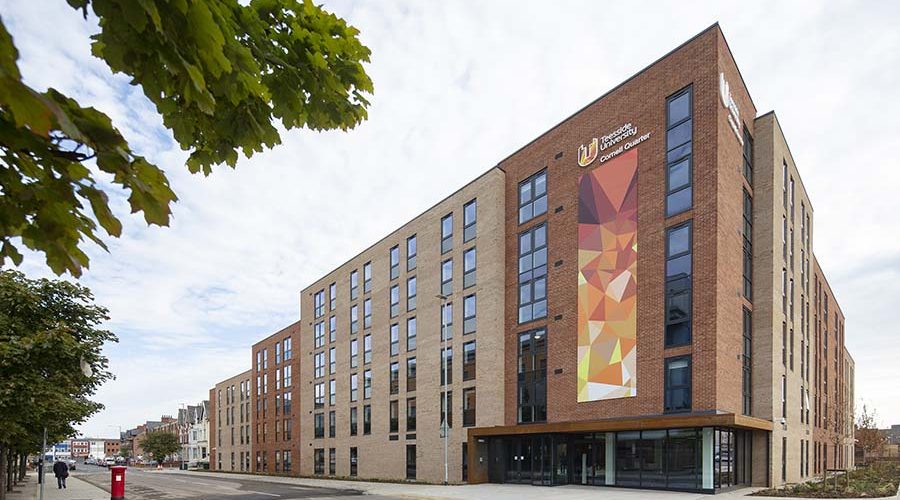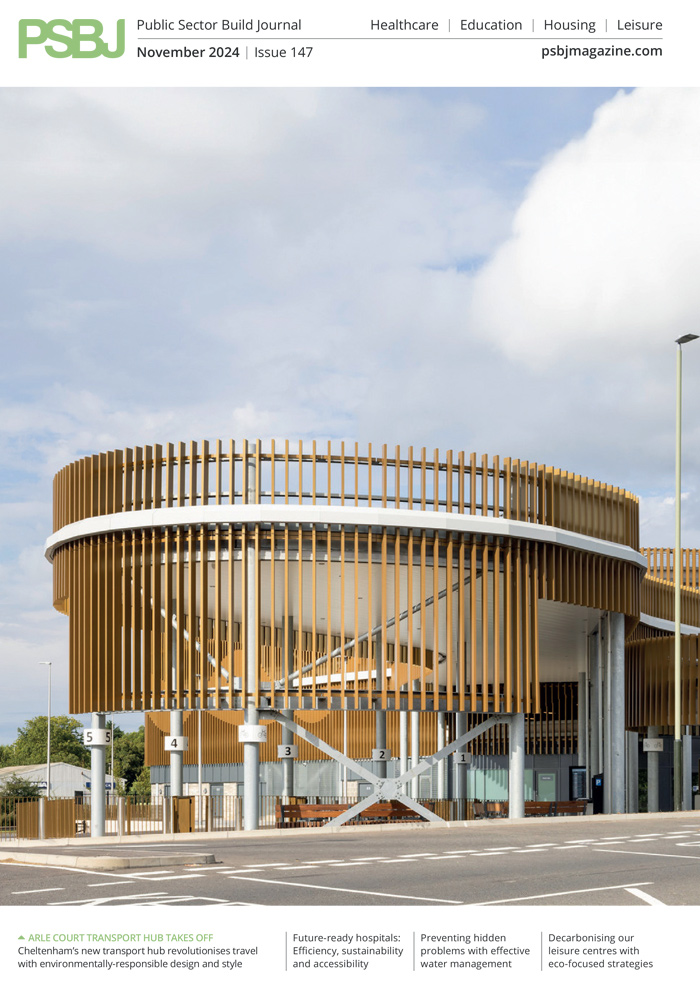When COVID-19 struck more than halfway through the Cornell Quarter construction programme at Teesside University, it would have been fair to imagine that the pandemic could severely disrupt work and result in a much-delayed finish.
Summers-Inman
Remarkably, however, with the project now officially handed over and occupied by students, it is particularly satisfying for the team involved in its construction, as well as Teesside University, to report that it was still completed in time for the new academic year and is now occupied by students.
It was also brought in on budget, without any incidence of COVID-19 on site, and to cap it all, Cornell Quarter achieved a BREEAM ‘Excellent’ rating. So how did the team pull it off? Trevor Trainor, Associate Director at Summers-Inman – the construction consultancy responsible for providing project management, contract administration and cost consultancy services – takes up the story.
The challenge
The Cornell Quarter forms part of Teesside University’s ambitious and ongoing £300m campus masterplan and comprises 300 en-suite student beds, a gymnasium, cinema room, laundry facilities and a 24-hour reception.
It sits at the eastern edge of the Middlesbrough campus and has a key role to play within the campus experience for the students who live there.
For Summers-Inman, it was the first project we secured following our appointment to the NEUPC framework (North East Universities Purchasing Consortium) at the end of 2018.
Cornell Quarter started on site on 1st April 2019, so from the outset, it was very much a time-critical project with a quick 75-week build period.
Then with only a few months to spare before completion, on 23rd March 2020, Prime Minister Boris Johnson announced a lockdown. Wates Construction was our delivery partner and main contractor on the scheme. With a good deal of lateral thinking and close collaboration with the university, the site was only closed for two days, enabling Wates to consider how best to proceed given the new, onerous requirements of site safety and social distancing, yet still maintain the momentum of the build.
The solution
All meetings were moved to online platforms, such as Teams and Skype. However, we were still required under the terms of the contract to prepare monthly valuations for payment. The contractor took site progress photographs and sent them back to us via email. Whilst this was helpful, we found that we needed to undertake site visits, which we did outside of hours when it was quieter and with few people around. The contractor played an enormous role in making sure the site was safe.
We followed the Construction Leadership Council’s Site Operating Procedures at all times, which included:
• Staggered start and finish times, where different trades had specific arrival and departure times, as well as lunch breaks
• A period of reorganisation was needed to undertake changes to offices and welfare areas – for example, reducing the number of tables
• Enhanced cleaning regimes were implemented, and cleaning was taking place all day long, particularly in the welfare areas
• The site, which was originally controlled by a biometric system for access, had to revert to free-spinning turnstyles with site cabin staff recording site traffic and equipped with a temperature gun as a double precaution
• Wates also adopted a split workforce approach using red and blue teams – this meant that if you were red, you couldn’t attend blue zones or blue sites and vice-versa – which helped reduce the risk of cross-contamination but also limited the number of people on site at any one time.
Using these measures, the number of personnel on site initially dropped from 150 to 60. We knew that these numbers, if maintained, would produce a substantially delayed handover. Therefore, we formulated a plan, along with the contractor and the university, to increase productivity.
This was achieved by operating a twilight shift pattern of 60 + 60 staff, so we had 120 personnel on site during any 24-hour period – still lower than the original number, but it allowed us to keep the job much closer to the original programme.
Additionally, with 300 individual bedrooms, a degree of limited isolation for those working within them was provided. We also adopted a one-way system in the building for operatives, with alternate staircases used for ascending and descending the building. With six staircases altogether on the project, it provided an effective one-way system to and from all areas of the building.
We were also fortunate that the campus was relatively quiet, with students moving to online learning, so an adjacent car park was used by sub-contractors for assembling components for installation and distanced welfare facilities, operating almost as a separate site.
Great teamwork
At this point, it is important to stress the complete collaboration on the site. Although we operated a continuous process of regular dialogue and risk assessment, it was all helped by great teamwork and a resounding ‘can-do’ attitude which could so easily have been replaced by defeatism, given the newness of the situation we were all facing – both as individuals and in a business context.
Exceptional teamwork helped us to overcome far more challenges that would otherwise have arisen with the pandemic, and we’re delighted to say that this has resulted in the university being able to market the rooms as planned – though with a reduced capacity to help ensure the health and safety of the university community.
Successful manangement
It is testimony to the entire project team that the site was only closed for a period of two days following the Prime Minister’s announcement, and that the scheme was delivered a mere three weeks beyond the original contractual completion date.
The fact that we were in a good place at the start of the pandemic contributed hugely to this outcome. Of course, it created extra work for Summers-Inman as project and cost managers, but we are managing change all the time, which is a fundamental feature of all projects, even without COVID-19.
We also greatly value our relationship with the university, which we have worked hard to develop. Through careful management and clear communication, we have been responsible for helping to successfully deliver a wide range of projects over the last 10 years, resulting in significant enhancements of the Teesside University campus.
We have also formed a very effective and collaborative working relationship with Wates Construction, with this project following on from the completion of the National Horizons Centre at the Teesside University campus in Darlington only last year, and we look forward to working with them on other projects in the future.
Malcolm Page, the Chief Operating Officer at the university, commented: “Cornell Quarter provides a first-class facility for students at the heart of the campus environment. Although things are a little different for students this year, I am delighted to see our first occupants have moved in and are able to enjoy this brand-new facility from the beginning of the academic year. We have been pleased to once again work in partnership with Wates and applaud the dedication, commitment and professionalism shown to get Cornell Quarter completed on time.”

















